Skills for Nursing Practice in Health and Social Care Settings
VerifiedAdded on 2020/01/15
|9
|4032
|60
Essay
AI Summary
This essay examines the critical skills required for nurses and healthcare professionals in the UK, focusing on the 'Compassion in Practice' strategy and its six core values, particularly care, compassion, and communication. The essay highlights the importance of these three Cs in delivering quality patient care, improving patient satisfaction, and fostering effective relationships between healthcare providers and patients. It discusses the practical implications of these skills, such as enhancing decision-making processes, promoting patient well-being, and addressing ethical conflicts. The author also reflects on personal experiences in NHS England, illustrating how improved communication and compassionate care can lead to better patient outcomes and a more positive healthcare environment. The essay emphasizes the need for nurses to develop these skills to meet the evolving needs of patients and ensure the delivery of high-quality healthcare services.

Skills for Practice
Paraphrase This Document
Need a fresh take? Get an instant paraphrase of this document with our AI Paraphraser
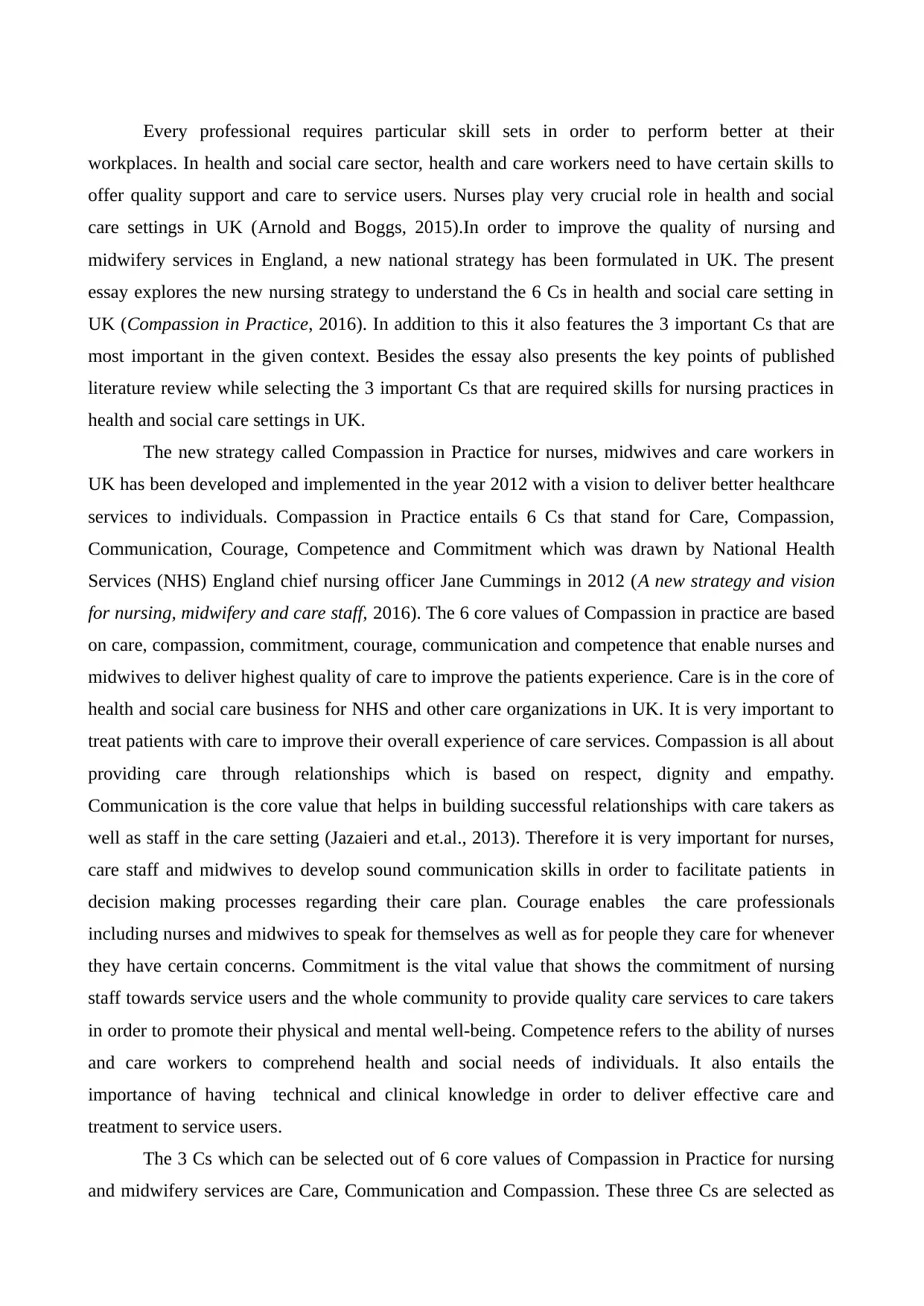
Every professional requires particular skill sets in order to perform better at their
workplaces. In health and social care sector, health and care workers need to have certain skills to
offer quality support and care to service users. Nurses play very crucial role in health and social
care settings in UK (Arnold and Boggs, 2015).In order to improve the quality of nursing and
midwifery services in England, a new national strategy has been formulated in UK. The present
essay explores the new nursing strategy to understand the 6 Cs in health and social care setting in
UK (Compassion in Practice, 2016). In addition to this it also features the 3 important Cs that are
most important in the given context. Besides the essay also presents the key points of published
literature review while selecting the 3 important Cs that are required skills for nursing practices in
health and social care settings in UK.
The new strategy called Compassion in Practice for nurses, midwives and care workers in
UK has been developed and implemented in the year 2012 with a vision to deliver better healthcare
services to individuals. Compassion in Practice entails 6 Cs that stand for Care, Compassion,
Communication, Courage, Competence and Commitment which was drawn by National Health
Services (NHS) England chief nursing officer Jane Cummings in 2012 (A new strategy and vision
for nursing, midwifery and care staff, 2016). The 6 core values of Compassion in practice are based
on care, compassion, commitment, courage, communication and competence that enable nurses and
midwives to deliver highest quality of care to improve the patients experience. Care is in the core of
health and social care business for NHS and other care organizations in UK. It is very important to
treat patients with care to improve their overall experience of care services. Compassion is all about
providing care through relationships which is based on respect, dignity and empathy.
Communication is the core value that helps in building successful relationships with care takers as
well as staff in the care setting (Jazaieri and et.al., 2013). Therefore it is very important for nurses,
care staff and midwives to develop sound communication skills in order to facilitate patients in
decision making processes regarding their care plan. Courage enables the care professionals
including nurses and midwives to speak for themselves as well as for people they care for whenever
they have certain concerns. Commitment is the vital value that shows the commitment of nursing
staff towards service users and the whole community to provide quality care services to care takers
in order to promote their physical and mental well-being. Competence refers to the ability of nurses
and care workers to comprehend health and social needs of individuals. It also entails the
importance of having technical and clinical knowledge in order to deliver effective care and
treatment to service users.
The 3 Cs which can be selected out of 6 core values of Compassion in Practice for nursing
and midwifery services are Care, Communication and Compassion. These three Cs are selected as
workplaces. In health and social care sector, health and care workers need to have certain skills to
offer quality support and care to service users. Nurses play very crucial role in health and social
care settings in UK (Arnold and Boggs, 2015).In order to improve the quality of nursing and
midwifery services in England, a new national strategy has been formulated in UK. The present
essay explores the new nursing strategy to understand the 6 Cs in health and social care setting in
UK (Compassion in Practice, 2016). In addition to this it also features the 3 important Cs that are
most important in the given context. Besides the essay also presents the key points of published
literature review while selecting the 3 important Cs that are required skills for nursing practices in
health and social care settings in UK.
The new strategy called Compassion in Practice for nurses, midwives and care workers in
UK has been developed and implemented in the year 2012 with a vision to deliver better healthcare
services to individuals. Compassion in Practice entails 6 Cs that stand for Care, Compassion,
Communication, Courage, Competence and Commitment which was drawn by National Health
Services (NHS) England chief nursing officer Jane Cummings in 2012 (A new strategy and vision
for nursing, midwifery and care staff, 2016). The 6 core values of Compassion in practice are based
on care, compassion, commitment, courage, communication and competence that enable nurses and
midwives to deliver highest quality of care to improve the patients experience. Care is in the core of
health and social care business for NHS and other care organizations in UK. It is very important to
treat patients with care to improve their overall experience of care services. Compassion is all about
providing care through relationships which is based on respect, dignity and empathy.
Communication is the core value that helps in building successful relationships with care takers as
well as staff in the care setting (Jazaieri and et.al., 2013). Therefore it is very important for nurses,
care staff and midwives to develop sound communication skills in order to facilitate patients in
decision making processes regarding their care plan. Courage enables the care professionals
including nurses and midwives to speak for themselves as well as for people they care for whenever
they have certain concerns. Commitment is the vital value that shows the commitment of nursing
staff towards service users and the whole community to provide quality care services to care takers
in order to promote their physical and mental well-being. Competence refers to the ability of nurses
and care workers to comprehend health and social needs of individuals. It also entails the
importance of having technical and clinical knowledge in order to deliver effective care and
treatment to service users.
The 3 Cs which can be selected out of 6 core values of Compassion in Practice for nursing
and midwifery services are Care, Communication and Compassion. These three Cs are selected as
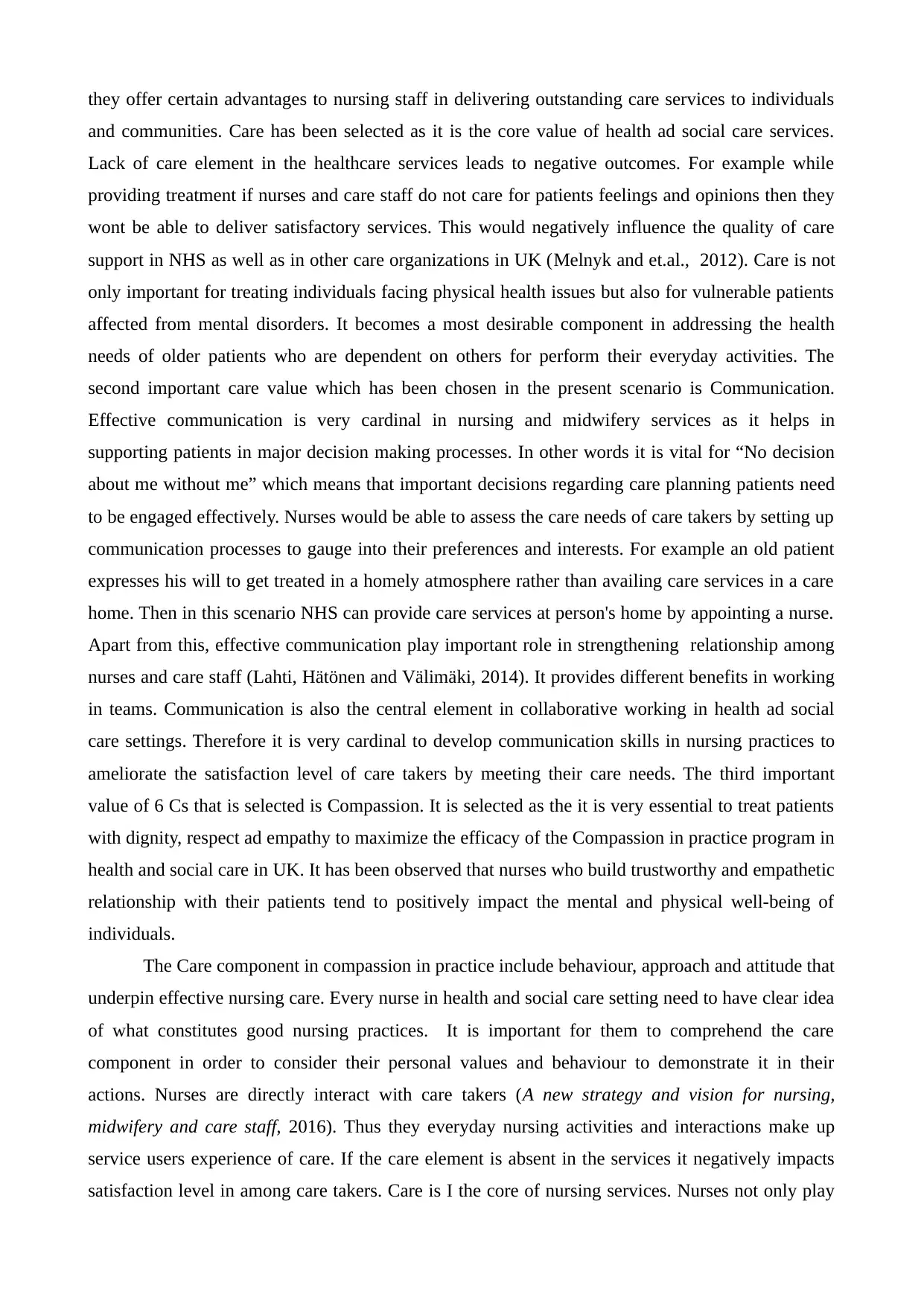
they offer certain advantages to nursing staff in delivering outstanding care services to individuals
and communities. Care has been selected as it is the core value of health ad social care services.
Lack of care element in the healthcare services leads to negative outcomes. For example while
providing treatment if nurses and care staff do not care for patients feelings and opinions then they
wont be able to deliver satisfactory services. This would negatively influence the quality of care
support in NHS as well as in other care organizations in UK (Melnyk and et.al., 2012). Care is not
only important for treating individuals facing physical health issues but also for vulnerable patients
affected from mental disorders. It becomes a most desirable component in addressing the health
needs of older patients who are dependent on others for perform their everyday activities. The
second important care value which has been chosen in the present scenario is Communication.
Effective communication is very cardinal in nursing and midwifery services as it helps in
supporting patients in major decision making processes. In other words it is vital for “No decision
about me without me” which means that important decisions regarding care planning patients need
to be engaged effectively. Nurses would be able to assess the care needs of care takers by setting up
communication processes to gauge into their preferences and interests. For example an old patient
expresses his will to get treated in a homely atmosphere rather than availing care services in a care
home. Then in this scenario NHS can provide care services at person's home by appointing a nurse.
Apart from this, effective communication play important role in strengthening relationship among
nurses and care staff (Lahti, Hätönen and Välimäki, 2014). It provides different benefits in working
in teams. Communication is also the central element in collaborative working in health ad social
care settings. Therefore it is very cardinal to develop communication skills in nursing practices to
ameliorate the satisfaction level of care takers by meeting their care needs. The third important
value of 6 Cs that is selected is Compassion. It is selected as the it is very essential to treat patients
with dignity, respect ad empathy to maximize the efficacy of the Compassion in practice program in
health and social care in UK. It has been observed that nurses who build trustworthy and empathetic
relationship with their patients tend to positively impact the mental and physical well-being of
individuals.
The Care component in compassion in practice include behaviour, approach and attitude that
underpin effective nursing care. Every nurse in health and social care setting need to have clear idea
of what constitutes good nursing practices. It is important for them to comprehend the care
component in order to consider their personal values and behaviour to demonstrate it in their
actions. Nurses are directly interact with care takers (A new strategy and vision for nursing,
midwifery and care staff, 2016). Thus they everyday nursing activities and interactions make up
service users experience of care. If the care element is absent in the services it negatively impacts
satisfaction level in among care takers. Care is I the core of nursing services. Nurses not only play
and communities. Care has been selected as it is the core value of health ad social care services.
Lack of care element in the healthcare services leads to negative outcomes. For example while
providing treatment if nurses and care staff do not care for patients feelings and opinions then they
wont be able to deliver satisfactory services. This would negatively influence the quality of care
support in NHS as well as in other care organizations in UK (Melnyk and et.al., 2012). Care is not
only important for treating individuals facing physical health issues but also for vulnerable patients
affected from mental disorders. It becomes a most desirable component in addressing the health
needs of older patients who are dependent on others for perform their everyday activities. The
second important care value which has been chosen in the present scenario is Communication.
Effective communication is very cardinal in nursing and midwifery services as it helps in
supporting patients in major decision making processes. In other words it is vital for “No decision
about me without me” which means that important decisions regarding care planning patients need
to be engaged effectively. Nurses would be able to assess the care needs of care takers by setting up
communication processes to gauge into their preferences and interests. For example an old patient
expresses his will to get treated in a homely atmosphere rather than availing care services in a care
home. Then in this scenario NHS can provide care services at person's home by appointing a nurse.
Apart from this, effective communication play important role in strengthening relationship among
nurses and care staff (Lahti, Hätönen and Välimäki, 2014). It provides different benefits in working
in teams. Communication is also the central element in collaborative working in health ad social
care settings. Therefore it is very cardinal to develop communication skills in nursing practices to
ameliorate the satisfaction level of care takers by meeting their care needs. The third important
value of 6 Cs that is selected is Compassion. It is selected as the it is very essential to treat patients
with dignity, respect ad empathy to maximize the efficacy of the Compassion in practice program in
health and social care in UK. It has been observed that nurses who build trustworthy and empathetic
relationship with their patients tend to positively impact the mental and physical well-being of
individuals.
The Care component in compassion in practice include behaviour, approach and attitude that
underpin effective nursing care. Every nurse in health and social care setting need to have clear idea
of what constitutes good nursing practices. It is important for them to comprehend the care
component in order to consider their personal values and behaviour to demonstrate it in their
actions. Nurses are directly interact with care takers (A new strategy and vision for nursing,
midwifery and care staff, 2016). Thus they everyday nursing activities and interactions make up
service users experience of care. If the care element is absent in the services it negatively impacts
satisfaction level in among care takers. Care is I the core of nursing services. Nurses not only play
⊘ This is a preview!⊘
Do you want full access?
Subscribe today to unlock all pages.

Trusted by 1+ million students worldwide
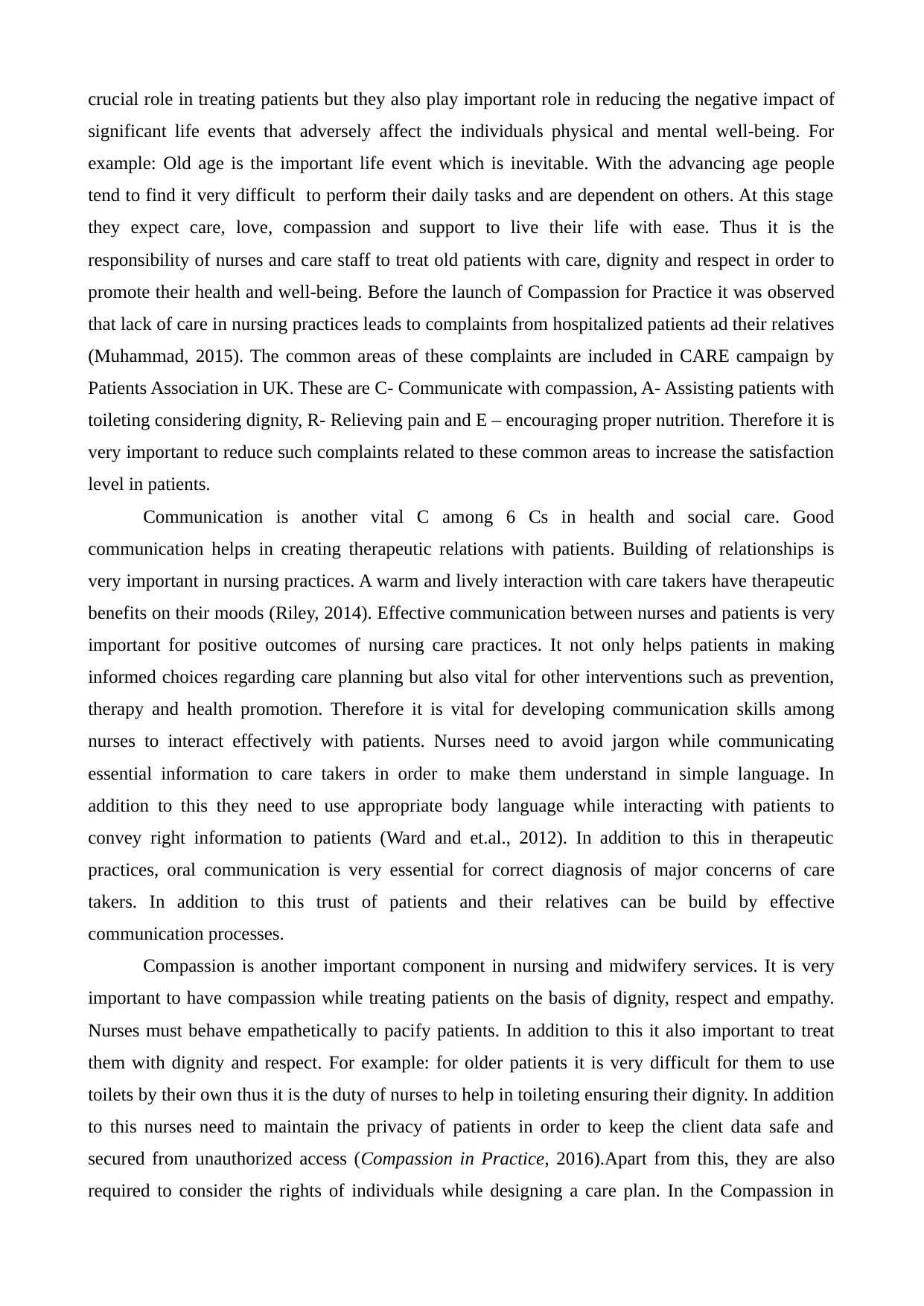
crucial role in treating patients but they also play important role in reducing the negative impact of
significant life events that adversely affect the individuals physical and mental well-being. For
example: Old age is the important life event which is inevitable. With the advancing age people
tend to find it very difficult to perform their daily tasks and are dependent on others. At this stage
they expect care, love, compassion and support to live their life with ease. Thus it is the
responsibility of nurses and care staff to treat old patients with care, dignity and respect in order to
promote their health and well-being. Before the launch of Compassion for Practice it was observed
that lack of care in nursing practices leads to complaints from hospitalized patients ad their relatives
(Muhammad, 2015). The common areas of these complaints are included in CARE campaign by
Patients Association in UK. These are C- Communicate with compassion, A- Assisting patients with
toileting considering dignity, R- Relieving pain and E – encouraging proper nutrition. Therefore it is
very important to reduce such complaints related to these common areas to increase the satisfaction
level in patients.
Communication is another vital C among 6 Cs in health and social care. Good
communication helps in creating therapeutic relations with patients. Building of relationships is
very important in nursing practices. A warm and lively interaction with care takers have therapeutic
benefits on their moods (Riley, 2014). Effective communication between nurses and patients is very
important for positive outcomes of nursing care practices. It not only helps patients in making
informed choices regarding care planning but also vital for other interventions such as prevention,
therapy and health promotion. Therefore it is vital for developing communication skills among
nurses to interact effectively with patients. Nurses need to avoid jargon while communicating
essential information to care takers in order to make them understand in simple language. In
addition to this they need to use appropriate body language while interacting with patients to
convey right information to patients (Ward and et.al., 2012). In addition to this in therapeutic
practices, oral communication is very essential for correct diagnosis of major concerns of care
takers. In addition to this trust of patients and their relatives can be build by effective
communication processes.
Compassion is another important component in nursing and midwifery services. It is very
important to have compassion while treating patients on the basis of dignity, respect and empathy.
Nurses must behave empathetically to pacify patients. In addition to this it also important to treat
them with dignity and respect. For example: for older patients it is very difficult for them to use
toilets by their own thus it is the duty of nurses to help in toileting ensuring their dignity. In addition
to this nurses need to maintain the privacy of patients in order to keep the client data safe and
secured from unauthorized access (Compassion in Practice, 2016).Apart from this, they are also
required to consider the rights of individuals while designing a care plan. In the Compassion in
significant life events that adversely affect the individuals physical and mental well-being. For
example: Old age is the important life event which is inevitable. With the advancing age people
tend to find it very difficult to perform their daily tasks and are dependent on others. At this stage
they expect care, love, compassion and support to live their life with ease. Thus it is the
responsibility of nurses and care staff to treat old patients with care, dignity and respect in order to
promote their health and well-being. Before the launch of Compassion for Practice it was observed
that lack of care in nursing practices leads to complaints from hospitalized patients ad their relatives
(Muhammad, 2015). The common areas of these complaints are included in CARE campaign by
Patients Association in UK. These are C- Communicate with compassion, A- Assisting patients with
toileting considering dignity, R- Relieving pain and E – encouraging proper nutrition. Therefore it is
very important to reduce such complaints related to these common areas to increase the satisfaction
level in patients.
Communication is another vital C among 6 Cs in health and social care. Good
communication helps in creating therapeutic relations with patients. Building of relationships is
very important in nursing practices. A warm and lively interaction with care takers have therapeutic
benefits on their moods (Riley, 2014). Effective communication between nurses and patients is very
important for positive outcomes of nursing care practices. It not only helps patients in making
informed choices regarding care planning but also vital for other interventions such as prevention,
therapy and health promotion. Therefore it is vital for developing communication skills among
nurses to interact effectively with patients. Nurses need to avoid jargon while communicating
essential information to care takers in order to make them understand in simple language. In
addition to this they need to use appropriate body language while interacting with patients to
convey right information to patients (Ward and et.al., 2012). In addition to this in therapeutic
practices, oral communication is very essential for correct diagnosis of major concerns of care
takers. In addition to this trust of patients and their relatives can be build by effective
communication processes.
Compassion is another important component in nursing and midwifery services. It is very
important to have compassion while treating patients on the basis of dignity, respect and empathy.
Nurses must behave empathetically to pacify patients. In addition to this it also important to treat
them with dignity and respect. For example: for older patients it is very difficult for them to use
toilets by their own thus it is the duty of nurses to help in toileting ensuring their dignity. In addition
to this nurses need to maintain the privacy of patients in order to keep the client data safe and
secured from unauthorized access (Compassion in Practice, 2016).Apart from this, they are also
required to consider the rights of individuals while designing a care plan. In the Compassion in
Paraphrase This Document
Need a fresh take? Get an instant paraphrase of this document with our AI Paraphraser
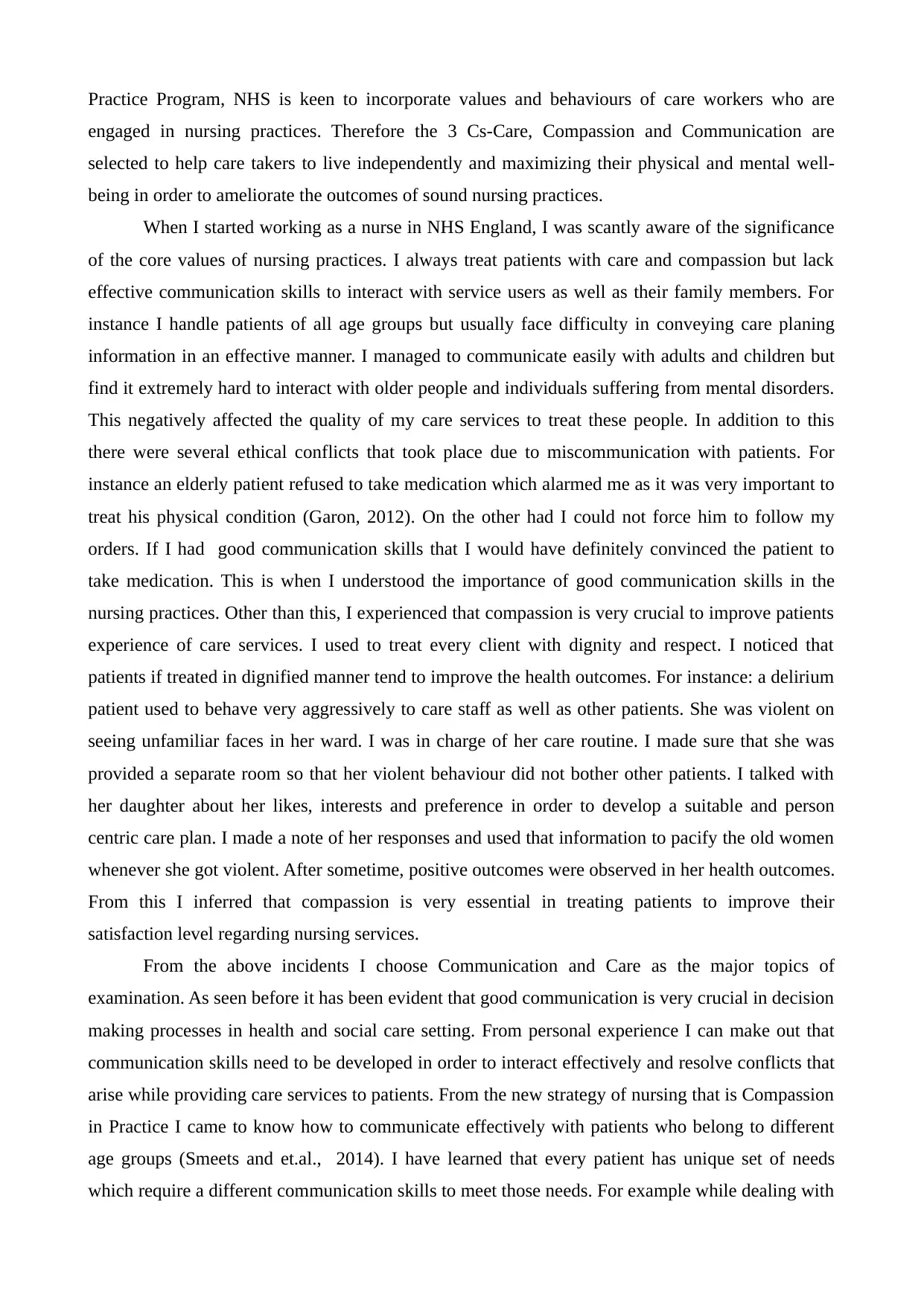
Practice Program, NHS is keen to incorporate values and behaviours of care workers who are
engaged in nursing practices. Therefore the 3 Cs-Care, Compassion and Communication are
selected to help care takers to live independently and maximizing their physical and mental well-
being in order to ameliorate the outcomes of sound nursing practices.
When I started working as a nurse in NHS England, I was scantly aware of the significance
of the core values of nursing practices. I always treat patients with care and compassion but lack
effective communication skills to interact with service users as well as their family members. For
instance I handle patients of all age groups but usually face difficulty in conveying care planing
information in an effective manner. I managed to communicate easily with adults and children but
find it extremely hard to interact with older people and individuals suffering from mental disorders.
This negatively affected the quality of my care services to treat these people. In addition to this
there were several ethical conflicts that took place due to miscommunication with patients. For
instance an elderly patient refused to take medication which alarmed me as it was very important to
treat his physical condition (Garon, 2012). On the other had I could not force him to follow my
orders. If I had good communication skills that I would have definitely convinced the patient to
take medication. This is when I understood the importance of good communication skills in the
nursing practices. Other than this, I experienced that compassion is very crucial to improve patients
experience of care services. I used to treat every client with dignity and respect. I noticed that
patients if treated in dignified manner tend to improve the health outcomes. For instance: a delirium
patient used to behave very aggressively to care staff as well as other patients. She was violent on
seeing unfamiliar faces in her ward. I was in charge of her care routine. I made sure that she was
provided a separate room so that her violent behaviour did not bother other patients. I talked with
her daughter about her likes, interests and preference in order to develop a suitable and person
centric care plan. I made a note of her responses and used that information to pacify the old women
whenever she got violent. After sometime, positive outcomes were observed in her health outcomes.
From this I inferred that compassion is very essential in treating patients to improve their
satisfaction level regarding nursing services.
From the above incidents I choose Communication and Care as the major topics of
examination. As seen before it has been evident that good communication is very crucial in decision
making processes in health and social care setting. From personal experience I can make out that
communication skills need to be developed in order to interact effectively and resolve conflicts that
arise while providing care services to patients. From the new strategy of nursing that is Compassion
in Practice I came to know how to communicate effectively with patients who belong to different
age groups (Smeets and et.al., 2014). I have learned that every patient has unique set of needs
which require a different communication skills to meet those needs. For example while dealing with
engaged in nursing practices. Therefore the 3 Cs-Care, Compassion and Communication are
selected to help care takers to live independently and maximizing their physical and mental well-
being in order to ameliorate the outcomes of sound nursing practices.
When I started working as a nurse in NHS England, I was scantly aware of the significance
of the core values of nursing practices. I always treat patients with care and compassion but lack
effective communication skills to interact with service users as well as their family members. For
instance I handle patients of all age groups but usually face difficulty in conveying care planing
information in an effective manner. I managed to communicate easily with adults and children but
find it extremely hard to interact with older people and individuals suffering from mental disorders.
This negatively affected the quality of my care services to treat these people. In addition to this
there were several ethical conflicts that took place due to miscommunication with patients. For
instance an elderly patient refused to take medication which alarmed me as it was very important to
treat his physical condition (Garon, 2012). On the other had I could not force him to follow my
orders. If I had good communication skills that I would have definitely convinced the patient to
take medication. This is when I understood the importance of good communication skills in the
nursing practices. Other than this, I experienced that compassion is very crucial to improve patients
experience of care services. I used to treat every client with dignity and respect. I noticed that
patients if treated in dignified manner tend to improve the health outcomes. For instance: a delirium
patient used to behave very aggressively to care staff as well as other patients. She was violent on
seeing unfamiliar faces in her ward. I was in charge of her care routine. I made sure that she was
provided a separate room so that her violent behaviour did not bother other patients. I talked with
her daughter about her likes, interests and preference in order to develop a suitable and person
centric care plan. I made a note of her responses and used that information to pacify the old women
whenever she got violent. After sometime, positive outcomes were observed in her health outcomes.
From this I inferred that compassion is very essential in treating patients to improve their
satisfaction level regarding nursing services.
From the above incidents I choose Communication and Care as the major topics of
examination. As seen before it has been evident that good communication is very crucial in decision
making processes in health and social care setting. From personal experience I can make out that
communication skills need to be developed in order to interact effectively and resolve conflicts that
arise while providing care services to patients. From the new strategy of nursing that is Compassion
in Practice I came to know how to communicate effectively with patients who belong to different
age groups (Smeets and et.al., 2014). I have learned that every patient has unique set of needs
which require a different communication skills to meet those needs. For example while dealing with
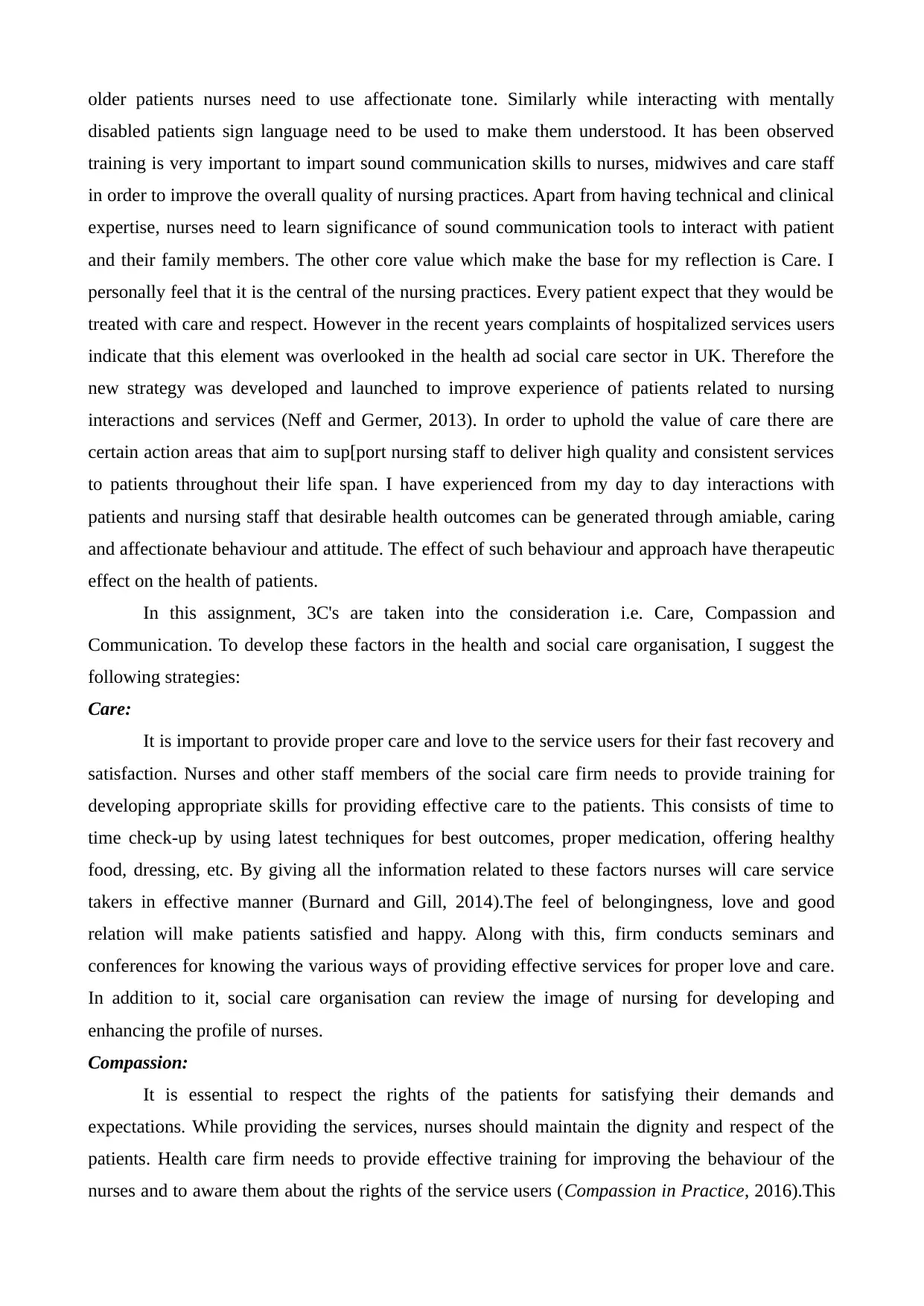
older patients nurses need to use affectionate tone. Similarly while interacting with mentally
disabled patients sign language need to be used to make them understood. It has been observed
training is very important to impart sound communication skills to nurses, midwives and care staff
in order to improve the overall quality of nursing practices. Apart from having technical and clinical
expertise, nurses need to learn significance of sound communication tools to interact with patient
and their family members. The other core value which make the base for my reflection is Care. I
personally feel that it is the central of the nursing practices. Every patient expect that they would be
treated with care and respect. However in the recent years complaints of hospitalized services users
indicate that this element was overlooked in the health ad social care sector in UK. Therefore the
new strategy was developed and launched to improve experience of patients related to nursing
interactions and services (Neff and Germer, 2013). In order to uphold the value of care there are
certain action areas that aim to sup[port nursing staff to deliver high quality and consistent services
to patients throughout their life span. I have experienced from my day to day interactions with
patients and nursing staff that desirable health outcomes can be generated through amiable, caring
and affectionate behaviour and attitude. The effect of such behaviour and approach have therapeutic
effect on the health of patients.
In this assignment, 3C's are taken into the consideration i.e. Care, Compassion and
Communication. To develop these factors in the health and social care organisation, I suggest the
following strategies:
Care:
It is important to provide proper care and love to the service users for their fast recovery and
satisfaction. Nurses and other staff members of the social care firm needs to provide training for
developing appropriate skills for providing effective care to the patients. This consists of time to
time check-up by using latest techniques for best outcomes, proper medication, offering healthy
food, dressing, etc. By giving all the information related to these factors nurses will care service
takers in effective manner (Burnard and Gill, 2014).The feel of belongingness, love and good
relation will make patients satisfied and happy. Along with this, firm conducts seminars and
conferences for knowing the various ways of providing effective services for proper love and care.
In addition to it, social care organisation can review the image of nursing for developing and
enhancing the profile of nurses.
Compassion:
It is essential to respect the rights of the patients for satisfying their demands and
expectations. While providing the services, nurses should maintain the dignity and respect of the
patients. Health care firm needs to provide effective training for improving the behaviour of the
nurses and to aware them about the rights of the service users (Compassion in Practice, 2016).This
disabled patients sign language need to be used to make them understood. It has been observed
training is very important to impart sound communication skills to nurses, midwives and care staff
in order to improve the overall quality of nursing practices. Apart from having technical and clinical
expertise, nurses need to learn significance of sound communication tools to interact with patient
and their family members. The other core value which make the base for my reflection is Care. I
personally feel that it is the central of the nursing practices. Every patient expect that they would be
treated with care and respect. However in the recent years complaints of hospitalized services users
indicate that this element was overlooked in the health ad social care sector in UK. Therefore the
new strategy was developed and launched to improve experience of patients related to nursing
interactions and services (Neff and Germer, 2013). In order to uphold the value of care there are
certain action areas that aim to sup[port nursing staff to deliver high quality and consistent services
to patients throughout their life span. I have experienced from my day to day interactions with
patients and nursing staff that desirable health outcomes can be generated through amiable, caring
and affectionate behaviour and attitude. The effect of such behaviour and approach have therapeutic
effect on the health of patients.
In this assignment, 3C's are taken into the consideration i.e. Care, Compassion and
Communication. To develop these factors in the health and social care organisation, I suggest the
following strategies:
Care:
It is important to provide proper care and love to the service users for their fast recovery and
satisfaction. Nurses and other staff members of the social care firm needs to provide training for
developing appropriate skills for providing effective care to the patients. This consists of time to
time check-up by using latest techniques for best outcomes, proper medication, offering healthy
food, dressing, etc. By giving all the information related to these factors nurses will care service
takers in effective manner (Burnard and Gill, 2014).The feel of belongingness, love and good
relation will make patients satisfied and happy. Along with this, firm conducts seminars and
conferences for knowing the various ways of providing effective services for proper love and care.
In addition to it, social care organisation can review the image of nursing for developing and
enhancing the profile of nurses.
Compassion:
It is essential to respect the rights of the patients for satisfying their demands and
expectations. While providing the services, nurses should maintain the dignity and respect of the
patients. Health care firm needs to provide effective training for improving the behaviour of the
nurses and to aware them about the rights of the service users (Compassion in Practice, 2016).This
⊘ This is a preview!⊘
Do you want full access?
Subscribe today to unlock all pages.

Trusted by 1+ million students worldwide
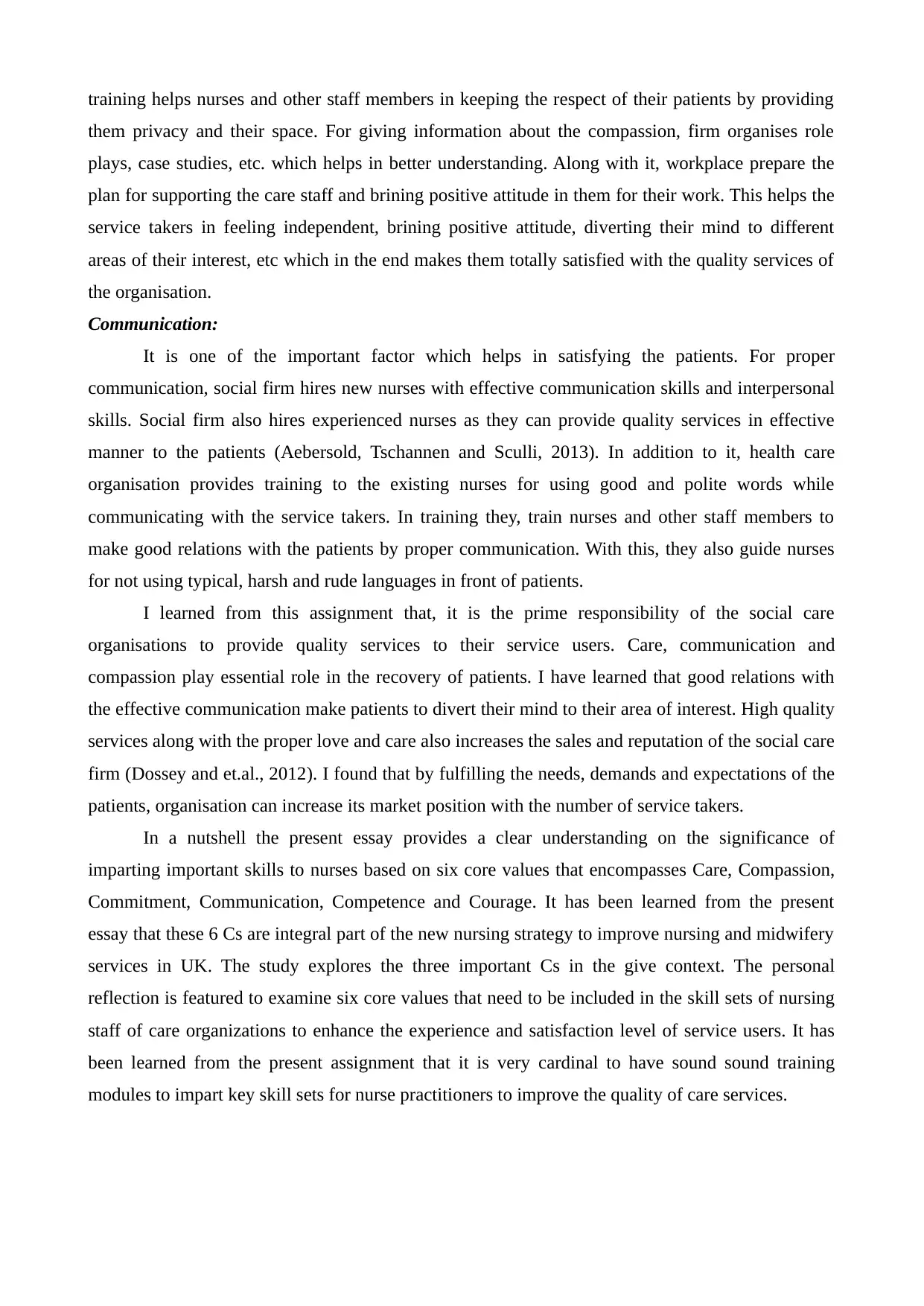
training helps nurses and other staff members in keeping the respect of their patients by providing
them privacy and their space. For giving information about the compassion, firm organises role
plays, case studies, etc. which helps in better understanding. Along with it, workplace prepare the
plan for supporting the care staff and brining positive attitude in them for their work. This helps the
service takers in feeling independent, brining positive attitude, diverting their mind to different
areas of their interest, etc which in the end makes them totally satisfied with the quality services of
the organisation.
Communication:
It is one of the important factor which helps in satisfying the patients. For proper
communication, social firm hires new nurses with effective communication skills and interpersonal
skills. Social firm also hires experienced nurses as they can provide quality services in effective
manner to the patients (Aebersold, Tschannen and Sculli, 2013). In addition to it, health care
organisation provides training to the existing nurses for using good and polite words while
communicating with the service takers. In training they, train nurses and other staff members to
make good relations with the patients by proper communication. With this, they also guide nurses
for not using typical, harsh and rude languages in front of patients.
I learned from this assignment that, it is the prime responsibility of the social care
organisations to provide quality services to their service users. Care, communication and
compassion play essential role in the recovery of patients. I have learned that good relations with
the effective communication make patients to divert their mind to their area of interest. High quality
services along with the proper love and care also increases the sales and reputation of the social care
firm (Dossey and et.al., 2012). I found that by fulfilling the needs, demands and expectations of the
patients, organisation can increase its market position with the number of service takers.
In a nutshell the present essay provides a clear understanding on the significance of
imparting important skills to nurses based on six core values that encompasses Care, Compassion,
Commitment, Communication, Competence and Courage. It has been learned from the present
essay that these 6 Cs are integral part of the new nursing strategy to improve nursing and midwifery
services in UK. The study explores the three important Cs in the give context. The personal
reflection is featured to examine six core values that need to be included in the skill sets of nursing
staff of care organizations to enhance the experience and satisfaction level of service users. It has
been learned from the present assignment that it is very cardinal to have sound sound training
modules to impart key skill sets for nurse practitioners to improve the quality of care services.
them privacy and their space. For giving information about the compassion, firm organises role
plays, case studies, etc. which helps in better understanding. Along with it, workplace prepare the
plan for supporting the care staff and brining positive attitude in them for their work. This helps the
service takers in feeling independent, brining positive attitude, diverting their mind to different
areas of their interest, etc which in the end makes them totally satisfied with the quality services of
the organisation.
Communication:
It is one of the important factor which helps in satisfying the patients. For proper
communication, social firm hires new nurses with effective communication skills and interpersonal
skills. Social firm also hires experienced nurses as they can provide quality services in effective
manner to the patients (Aebersold, Tschannen and Sculli, 2013). In addition to it, health care
organisation provides training to the existing nurses for using good and polite words while
communicating with the service takers. In training they, train nurses and other staff members to
make good relations with the patients by proper communication. With this, they also guide nurses
for not using typical, harsh and rude languages in front of patients.
I learned from this assignment that, it is the prime responsibility of the social care
organisations to provide quality services to their service users. Care, communication and
compassion play essential role in the recovery of patients. I have learned that good relations with
the effective communication make patients to divert their mind to their area of interest. High quality
services along with the proper love and care also increases the sales and reputation of the social care
firm (Dossey and et.al., 2012). I found that by fulfilling the needs, demands and expectations of the
patients, organisation can increase its market position with the number of service takers.
In a nutshell the present essay provides a clear understanding on the significance of
imparting important skills to nurses based on six core values that encompasses Care, Compassion,
Commitment, Communication, Competence and Courage. It has been learned from the present
essay that these 6 Cs are integral part of the new nursing strategy to improve nursing and midwifery
services in UK. The study explores the three important Cs in the give context. The personal
reflection is featured to examine six core values that need to be included in the skill sets of nursing
staff of care organizations to enhance the experience and satisfaction level of service users. It has
been learned from the present assignment that it is very cardinal to have sound sound training
modules to impart key skill sets for nurse practitioners to improve the quality of care services.
Paraphrase This Document
Need a fresh take? Get an instant paraphrase of this document with our AI Paraphraser
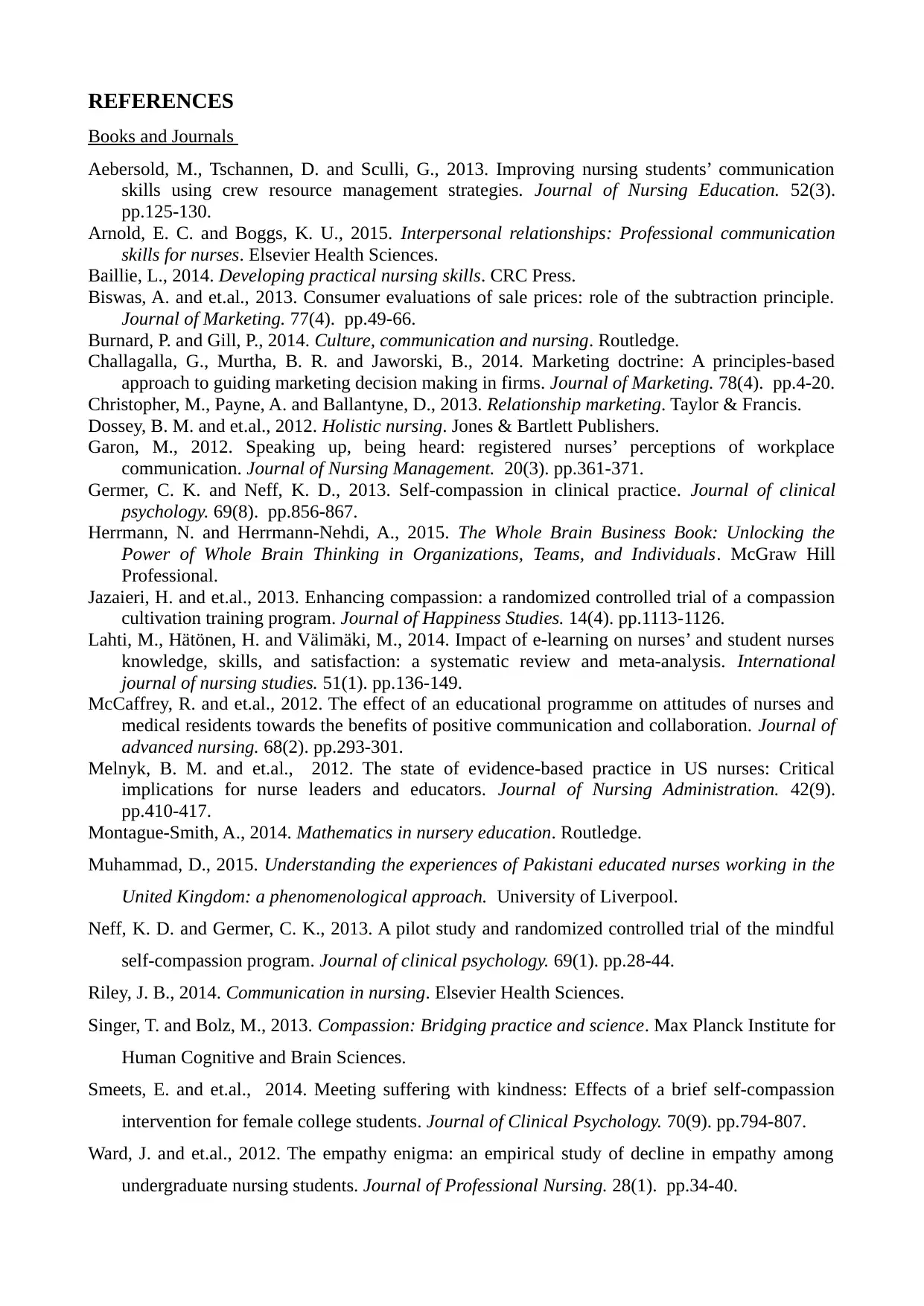
REFERENCES
Books and Journals
Aebersold, M., Tschannen, D. and Sculli, G., 2013. Improving nursing students’ communication
skills using crew resource management strategies. Journal of Nursing Education. 52(3).
pp.125-130.
Arnold, E. C. and Boggs, K. U., 2015. Interpersonal relationships: Professional communication
skills for nurses. Elsevier Health Sciences.
Baillie, L., 2014. Developing practical nursing skills. CRC Press.
Biswas, A. and et.al., 2013. Consumer evaluations of sale prices: role of the subtraction principle.
Journal of Marketing. 77(4). pp.49-66.
Burnard, P. and Gill, P., 2014. Culture, communication and nursing. Routledge.
Challagalla, G., Murtha, B. R. and Jaworski, B., 2014. Marketing doctrine: A principles-based
approach to guiding marketing decision making in firms. Journal of Marketing. 78(4). pp.4-20.
Christopher, M., Payne, A. and Ballantyne, D., 2013. Relationship marketing. Taylor & Francis.
Dossey, B. M. and et.al., 2012. Holistic nursing. Jones & Bartlett Publishers.
Garon, M., 2012. Speaking up, being heard: registered nurses’ perceptions of workplace
communication. Journal of Nursing Management. 20(3). pp.361-371.
Germer, C. K. and Neff, K. D., 2013. Self‐compassion in clinical practice. Journal of clinical
psychology. 69(8). pp.856-867.
Herrmann, N. and Herrmann-Nehdi, A., 2015. The Whole Brain Business Book: Unlocking the
Power of Whole Brain Thinking in Organizations, Teams, and Individuals. McGraw Hill
Professional.
Jazaieri, H. and et.al., 2013. Enhancing compassion: a randomized controlled trial of a compassion
cultivation training program. Journal of Happiness Studies. 14(4). pp.1113-1126.
Lahti, M., Hätönen, H. and Välimäki, M., 2014. Impact of e-learning on nurses’ and student nurses
knowledge, skills, and satisfaction: a systematic review and meta-analysis. International
journal of nursing studies. 51(1). pp.136-149.
McCaffrey, R. and et.al., 2012. The effect of an educational programme on attitudes of nurses and
medical residents towards the benefits of positive communication and collaboration. Journal of
advanced nursing. 68(2). pp.293-301.
Melnyk, B. M. and et.al., 2012. The state of evidence-based practice in US nurses: Critical
implications for nurse leaders and educators. Journal of Nursing Administration. 42(9).
pp.410-417.
Montague-Smith, A., 2014. Mathematics in nursery education. Routledge.
Muhammad, D., 2015. Understanding the experiences of Pakistani educated nurses working in the
United Kingdom: a phenomenological approach. University of Liverpool.
Neff, K. D. and Germer, C. K., 2013. A pilot study and randomized controlled trial of the mindful
self‐compassion program. Journal of clinical psychology. 69(1). pp.28-44.
Riley, J. B., 2014. Communication in nursing. Elsevier Health Sciences.
Singer, T. and Bolz, M., 2013. Compassion: Bridging practice and science. Max Planck Institute for
Human Cognitive and Brain Sciences.
Smeets, E. and et.al., 2014. Meeting suffering with kindness: Effects of a brief self‐compassion
intervention for female college students. Journal of Clinical Psychology. 70(9). pp.794-807.
Ward, J. and et.al., 2012. The empathy enigma: an empirical study of decline in empathy among
undergraduate nursing students. Journal of Professional Nursing. 28(1). pp.34-40.
Books and Journals
Aebersold, M., Tschannen, D. and Sculli, G., 2013. Improving nursing students’ communication
skills using crew resource management strategies. Journal of Nursing Education. 52(3).
pp.125-130.
Arnold, E. C. and Boggs, K. U., 2015. Interpersonal relationships: Professional communication
skills for nurses. Elsevier Health Sciences.
Baillie, L., 2014. Developing practical nursing skills. CRC Press.
Biswas, A. and et.al., 2013. Consumer evaluations of sale prices: role of the subtraction principle.
Journal of Marketing. 77(4). pp.49-66.
Burnard, P. and Gill, P., 2014. Culture, communication and nursing. Routledge.
Challagalla, G., Murtha, B. R. and Jaworski, B., 2014. Marketing doctrine: A principles-based
approach to guiding marketing decision making in firms. Journal of Marketing. 78(4). pp.4-20.
Christopher, M., Payne, A. and Ballantyne, D., 2013. Relationship marketing. Taylor & Francis.
Dossey, B. M. and et.al., 2012. Holistic nursing. Jones & Bartlett Publishers.
Garon, M., 2012. Speaking up, being heard: registered nurses’ perceptions of workplace
communication. Journal of Nursing Management. 20(3). pp.361-371.
Germer, C. K. and Neff, K. D., 2013. Self‐compassion in clinical practice. Journal of clinical
psychology. 69(8). pp.856-867.
Herrmann, N. and Herrmann-Nehdi, A., 2015. The Whole Brain Business Book: Unlocking the
Power of Whole Brain Thinking in Organizations, Teams, and Individuals. McGraw Hill
Professional.
Jazaieri, H. and et.al., 2013. Enhancing compassion: a randomized controlled trial of a compassion
cultivation training program. Journal of Happiness Studies. 14(4). pp.1113-1126.
Lahti, M., Hätönen, H. and Välimäki, M., 2014. Impact of e-learning on nurses’ and student nurses
knowledge, skills, and satisfaction: a systematic review and meta-analysis. International
journal of nursing studies. 51(1). pp.136-149.
McCaffrey, R. and et.al., 2012. The effect of an educational programme on attitudes of nurses and
medical residents towards the benefits of positive communication and collaboration. Journal of
advanced nursing. 68(2). pp.293-301.
Melnyk, B. M. and et.al., 2012. The state of evidence-based practice in US nurses: Critical
implications for nurse leaders and educators. Journal of Nursing Administration. 42(9).
pp.410-417.
Montague-Smith, A., 2014. Mathematics in nursery education. Routledge.
Muhammad, D., 2015. Understanding the experiences of Pakistani educated nurses working in the
United Kingdom: a phenomenological approach. University of Liverpool.
Neff, K. D. and Germer, C. K., 2013. A pilot study and randomized controlled trial of the mindful
self‐compassion program. Journal of clinical psychology. 69(1). pp.28-44.
Riley, J. B., 2014. Communication in nursing. Elsevier Health Sciences.
Singer, T. and Bolz, M., 2013. Compassion: Bridging practice and science. Max Planck Institute for
Human Cognitive and Brain Sciences.
Smeets, E. and et.al., 2014. Meeting suffering with kindness: Effects of a brief self‐compassion
intervention for female college students. Journal of Clinical Psychology. 70(9). pp.794-807.
Ward, J. and et.al., 2012. The empathy enigma: an empirical study of decline in empathy among
undergraduate nursing students. Journal of Professional Nursing. 28(1). pp.34-40.

Online
Compassion in Practice, 2016.[Online] Available through: <http://www.nhsemployers.org/your-
workforce/plan/nursing-workforce/compassion-in-practice>. [Accessed on 2nd February 2016].
A new strategy and vision for nursing, midwifery and care staff, 2016.[Online] Available through:
<https://www.england.nhs.uk/nursingvision/>. [Accessed on 2nd February 2016].
Compassion in Practice, 2016.[Online] Available through: <http://www.nhsemployers.org/your-
workforce/plan/nursing-workforce/compassion-in-practice>. [Accessed on 2nd February 2016].
A new strategy and vision for nursing, midwifery and care staff, 2016.[Online] Available through:
<https://www.england.nhs.uk/nursingvision/>. [Accessed on 2nd February 2016].
⊘ This is a preview!⊘
Do you want full access?
Subscribe today to unlock all pages.

Trusted by 1+ million students worldwide
1 out of 9
Related Documents
Your All-in-One AI-Powered Toolkit for Academic Success.
+13062052269
info@desklib.com
Available 24*7 on WhatsApp / Email
![[object Object]](/_next/static/media/star-bottom.7253800d.svg)
Unlock your academic potential
Copyright © 2020–2026 A2Z Services. All Rights Reserved. Developed and managed by ZUCOL.




